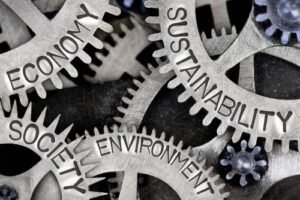 When sustainability comes up in a retail conversation, you can quickly be overwhelmed by the enormity of the responsibility and depth of the issue for the industry. It’s far-reaching and has incredible consequences. Retailers have one of the world’s most visible consumption and production positions. Plus, nearly every facet of the business, from the time a product is manufactured until it is delivered into consumers’ hands, has an environmental impact.
When sustainability comes up in a retail conversation, you can quickly be overwhelmed by the enormity of the responsibility and depth of the issue for the industry. It’s far-reaching and has incredible consequences. Retailers have one of the world’s most visible consumption and production positions. Plus, nearly every facet of the business, from the time a product is manufactured until it is delivered into consumers’ hands, has an environmental impact.
According to a recent First Insight study, on average, 75% of all generational groups, from Gen Z to Baby Boomers, expect brands and retailers to be more sustainable, with Millennials caring the most at 79%. Rarely do all generations agree so completely on an issue.
Not only does the majority expect increased sustainability, but one-third of people surveyed by Simon-Kucher & Partners said they are willing pay more, giving retailers the green light to launch initiatives that are good for the planet while subsidizing some of the cost.
How we get there and what it means to be a sustainable retailer is still unchartered territory for most chains, but it is quickly becoming a priority.
Retailers’ Environmental Responsibility
 Consumers care about how goods are produced, what they are made from, how they are packaged, and post-product life recycling possibilities. People don’t just want sustainability in products but also in business practices. They care about how workers are treated if the facilities are green, and what social causes they stand for or against. So, precisely what are retailers responsible for when it comes to sustainability? In the eyes of the customer, pretty much everything.
Consumers care about how goods are produced, what they are made from, how they are packaged, and post-product life recycling possibilities. People don’t just want sustainability in products but also in business practices. They care about how workers are treated if the facilities are green, and what social causes they stand for or against. So, precisely what are retailers responsible for when it comes to sustainability? In the eyes of the customer, pretty much everything.
A recent report by Boston Consulting group (BCG) reports that retailers are responsible for more than 25% of global emissions and are one of the largest contributors to plastic packaging, which makes up 40% of plastic usage globally. Retailers agree that something needs to be done. According to The State of Online Grocery Shopping 2022, almost 100% of retailer respondents said they need to develop better sustainability initiatives beyond packaging.
Upsides to Sustainability
 The key to a sustainable retail sustainability strategy is to focus on the advantages and to factor in other measurements besides the bottom line and gross profit margin. Ron Jarvis, chief sustainability officer at The Home Depot, is quoted as saying, “In today’s world, sustainability, responsibility is a competitive measurement.”
The key to a sustainable retail sustainability strategy is to focus on the advantages and to factor in other measurements besides the bottom line and gross profit margin. Ron Jarvis, chief sustainability officer at The Home Depot, is quoted as saying, “In today’s world, sustainability, responsibility is a competitive measurement.”
Other retailer benefits from the BCG report include – Sustainability initiatives will drive value in the next 5 to 10 years and the retailers that align with that belief know that harnessing sustainability as a competitive advantage can unlock sources of value, reduce costs, grant access to new revenue pools, reduce the cost of capital, achieving higher customer and employee retention plus the potential for tapping into new value pools such as additional revenue streams and circular business models.
Sustainability in retail will be the great divider as we move into a future where the planet, climate change, and social justice become more important than revenue. In the boardroom, money talks. A Deloitte study found that 59% of investors look for companies that share their values. The flow of money going forward will go to sustainable retail brands.
While short term, an investment in sustainability may cut into profit margins, experts do not believe it will stay that way. Eventually, like most things in the marketplace, the costs will come down, and it will be the new standard for conducting business.
Challenges to Sustainability in Retail
When it comes to sustainability in retail, the path is not without its challenges. On the one hand, you have retailers prioritizing and committing budgets, and on the other, you have a network of suppliers and vendors that may still need to reach that point.
Seventy-five percent of retailers said in the BCG report advised that low commitment from suppliers on sustainability is an obstacle thus making vital their choice of which companies they’ll do business with. Downstream, this will put pressure on those suppliers behind the ball to step up and take sustainability seriously as well.
Forward Thinking Retailers
 Many retailers have initiatives underway for sustainability. Even if it’s just something like adding micro-fulfillment centers to reduce the distance a product needs to travel to reach a consumer. This is just the tip of the proverbial iceberg, however. Organization-wide change needs to occur to build a strong sustainability foundation for the future. Retailers must address climate change, social inequality, and social responsibility head-on and in the public view.
Many retailers have initiatives underway for sustainability. Even if it’s just something like adding micro-fulfillment centers to reduce the distance a product needs to travel to reach a consumer. This is just the tip of the proverbial iceberg, however. Organization-wide change needs to occur to build a strong sustainability foundation for the future. Retailers must address climate change, social inequality, and social responsibility head-on and in the public view.
At Mainstreet Services, sustainability is one of our focus areas for discussion and for our business in the coming year. In the next blog in our series, we will report on the various retailer sustainability rankings. Stay tuned!
In the meantime, if you have any questions about sustainability in your business or would like to engage our team in discussions, we would love to hear from you.
